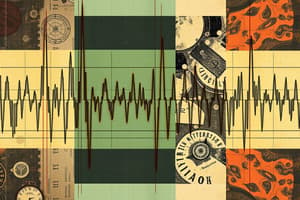Podcast
Questions and Answers
What is the expression for the real part of the function f(z)?
What is the expression for the real part of the function f(z)?
- -e^y sin x
- e^(-y) sin x
- e^y cos x
- e^(-y) cos x (correct)
According to the Cauchy-Riemann equations, what is the relationship between $\frac{\partial u}{\partial x}$ and $\frac{\partial v}{\partial y}$?
According to the Cauchy-Riemann equations, what is the relationship between $\frac{\partial u}{\partial x}$ and $\frac{\partial v}{\partial y}$?
- $\frac{\partial u}{\partial x} \cdot \frac{\partial v}{\partial y} = -1$
- $\frac{\partial u}{\partial x} = -\frac{\partial v}{\partial y}$ (correct)
- $\frac{\partial u}{\partial x} = \frac{\partial v}{\partial y}$
- $\frac{\partial u}{\partial x} \cdot \frac{\partial v}{\partial y} = 1$
What is the value of f(x) determined from the equation derived from Cauchy-Riemann?
What is the value of f(x) determined from the equation derived from Cauchy-Riemann?
- k (correct)
- e^{-x}
- e^x
- 0
What is the final expression for v when k is set to 0?
What is the final expression for v when k is set to 0?
What is the maximum value of the determinant for 2 × 2 real symmetric matrices with trace 14?
What is the maximum value of the determinant for 2 × 2 real symmetric matrices with trace 14?
What is the formula to calculate the damped natural frequency of an undamped second-order system?
What is the formula to calculate the damped natural frequency of an undamped second-order system?
If the natural frequency of an undamped second-order system is 40 rad/s and the damping ratio is 0.3, what is the value of the damping ratio squared?
If the natural frequency of an undamped second-order system is 40 rad/s and the damping ratio is 0.3, what is the value of the damping ratio squared?
What effect does increasing the damping ratio have on the damped natural frequency?
What effect does increasing the damping ratio have on the damped natural frequency?
What would be the damped natural frequency if the damping ratio were increased to 1.0 with the same undamped natural frequency of 40 rad/s?
What would be the damped natural frequency if the damping ratio were increased to 1.0 with the same undamped natural frequency of 40 rad/s?
For the given transfer function examples, what form does option (3) represent?
For the given transfer function examples, what form does option (3) represent?
What is the relationship between the zeros of x(z) indicated by the given information?
What is the relationship between the zeros of x(z) indicated by the given information?
What is the defined property of x(z) in terms of z-transfer time reversal?
What is the defined property of x(z) in terms of z-transfer time reversal?
How is the power of the nth harmonic component of a periodic square wave calculated?
How is the power of the nth harmonic component of a periodic square wave calculated?
What is the ratio of the power in the 7th harmonic to the power in the 5th harmonic for the periodic square wave?
What is the ratio of the power in the 7th harmonic to the power in the 5th harmonic for the periodic square wave?
If the power in the 5th harmonic component of a periodic square wave is 25 units, what would be the power in the 7th harmonic component?
If the power in the 5th harmonic component of a periodic square wave is 25 units, what would be the power in the 7th harmonic component?
What form does the z-transform follow according to the z-transfer time reversal property?
What form does the z-transform follow according to the z-transfer time reversal property?
Which of the following statements about the zeros of a function is true given one zero is 0.5 + j0.25?
Which of the following statements about the zeros of a function is true given one zero is 0.5 + j0.25?
For a periodic square wave, what does the nth harmonic component power indicate in relation to its frequency?
For a periodic square wave, what does the nth harmonic component power indicate in relation to its frequency?
What is the coupling factor (k) when 56% of the total flux from one coil links the other coil?
What is the coupling factor (k) when 56% of the total flux from one coil links the other coil?
What is the formula used to calculate mutual inductance (M) in magnetically coupled circuits?
What is the formula used to calculate mutual inductance (M) in magnetically coupled circuits?
If L1 is 4H and L2 is 5H, what is the mutual inductance (M) when k is 0.56?
If L1 is 4H and L2 is 5H, what is the mutual inductance (M) when k is 0.56?
Given electron mobility μn = 1000 cm²/V-s and concentration gradient of 1 × 10²¹/cm⁴, what type of current is being calculated?
Given electron mobility μn = 1000 cm²/V-s and concentration gradient of 1 × 10²¹/cm⁴, what type of current is being calculated?
What is the significance of kT/q being equal to 25 mV in this context?
What is the significance of kT/q being equal to 25 mV in this context?
What is the value of electronic charge (q) used in these calculations?
What is the value of electronic charge (q) used in these calculations?
What is the unit of measurement for mutual inductance (M)?
What is the unit of measurement for mutual inductance (M)?
What is the magnitude of electron diffusion current density when the concentration gradient is 1 × 10²¹/cm⁴?
What is the magnitude of electron diffusion current density when the concentration gradient is 1 × 10²¹/cm⁴?
What is the value of $xp$ calculated from the given equations?
What is the value of $xp$ calculated from the given equations?
What is the depletion width formula stated?
What is the depletion width formula stated?
Given $V_i = 5sin(wt)$, what is the maximum output voltage $V_o$?
Given $V_i = 5sin(wt)$, what is the maximum output voltage $V_o$?
What is the voltage drop across the diode when forward-biased?
What is the voltage drop across the diode when forward-biased?
What are the minimum and maximum output voltages $V_o$ in Volts if $V_i$ is sinusoidal?
What are the minimum and maximum output voltages $V_o$ in Volts if $V_i$ is sinusoidal?
What is the relationship between $N_A$ and $N_D$ in the depletion width formula?
What is the relationship between $N_A$ and $N_D$ in the depletion width formula?
What does the variable $V_R$ typically represent in diode circuits?
What does the variable $V_R$ typically represent in diode circuits?
What effect does a larger $V_0$ have on the depletion width $w$?
What effect does a larger $V_0$ have on the depletion width $w$?
Study Notes
Z-Transform and Signal Properties
- Time reversal property: If ( x(n) = x(-n) ), then the Z-transform relation is ( x(z) = x(z^{-1}) ).
- A zero of ( x(z) ) is at ( 0.5 + j0.25 ), implying ( x(0.5 + j0.25) = 0 ).
- The reciprocal zero property indicates another zero at ( 0.5 + j0.25 ).
Power Ratio in Harmonics
- For a periodic square wave, the power ratio of the 7th harmonic to the 5th harmonic is calculated.
- The nth harmonic power of a square wave is proportional to ( \frac{1}{n^2} ).
- Ratio derived: ( \frac{P_7}{P_5} = \frac{7^2}{5^2} = 0.5 ).
Natural Frequency and Damping in Control Systems
- An undamped second-order system has a natural frequency ( \omega_n = 40 , \text{rad/s} ).
- With a damping ratio ( \xi = 0.3 ), the damped natural frequency is calculated using ( \omega_d = \omega_n \sqrt{1 - \xi^2} ).
- The result yields ( \omega_d \approx 38.157 , \text{rad/s} ).
Transfer Function in Control Systems
- The transfer function for a system where ( X_1(s) = 0 ) is identified.
- Possible options for the transfer function included several rational functions.
- The correct transfer function option is (B).
Determinant of Symmetric Matrices
- The maximum determinant value among all ( 2 \times 2 ) symmetric matrices with trace 14 is sought.
- The determinant can be optimized under the constraints given, leading to a calculated value.
Magnetic Coupled Circuits
- In a magnetically coupled circuit, 56% of the flux from one coil links to another.
- The coupling factor ( k = 0.56 ).
- Mutual inductance ( M ) is computed using ( M = k \sqrt{L_1 L_2} ), resulting in ( M = 2.50 , \text{H} ).
Electron Diffusion in Semiconductor Physics
- Given parameters include electron charge ( q = 1.6 \times 10^{-19} , C ) and electron mobility ( \mu_n = 1000 , \text{cm}^2/\text{V·s} ).
- A concentration gradient of ( 1 \times 10^{21}/\text{cm}^4 ) leads to calculations of electron diffusion current density.
- Determination of the depletion width and its dependence on given voltage values occurs.
Diode Circuit Analysis
- For a diode with ( V_{on} = 0.7 , \text{V} ) in a circuit with ( V_i = 5\sin(\omega t) , \text{V} ), analysis of min/max values of output voltage ( V_o ) is conducted.
- Key answer choices include ranges for ( V_o ) based on circuit behavior.
These notes summarize concepts from signals, control systems, electromagnetism, and semiconductor physics relevant to the stated problems.
Studying That Suits You
Use AI to generate personalized quizzes and flashcards to suit your learning preferences.
Description
Test your knowledge on Z-Transform properties, harmonic power ratios in signals, and concepts of natural frequency in control systems. This quiz covers essential principles and calculations, including damping ratios and transfer functions. Ideal for those studying control systems and signal processing.




